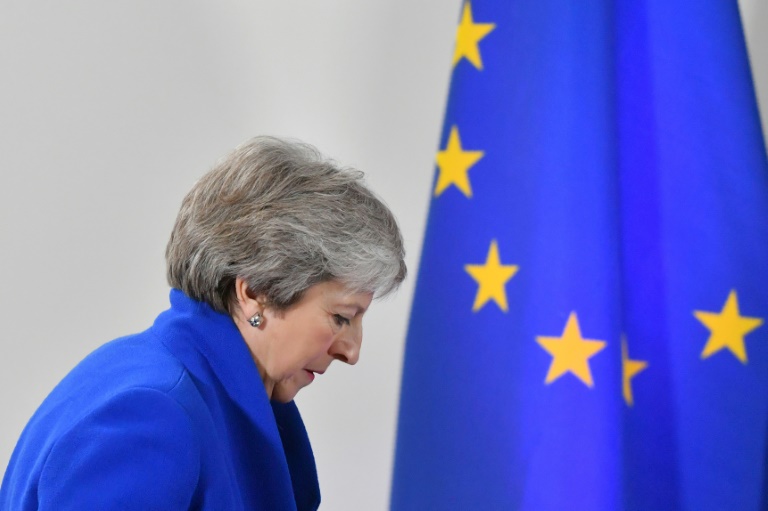
Theresa May will convene her cabinet and update parliament on the newly-agreed Brexit deal Monday, as the embattled British prime minister begins the tricky task of selling the plan to a skeptical country.
May returns to a mutinous parliament after sealing the agreement with European Union leaders at a summit in Brussels, where both sides insisted the agreement was the best and only option available.
But she faces a big battle to win MPs’ approval ahead of a vote next month, with lawmakers from all parties, including Conservative colleagues, opposed.
“We can back this deal, deliver on the vote of the referendum and move on to building a brighter future… Or this house can choose to reject this deal and go back to square one.
“It would open the door to more division and more uncertainty, with all the risks that will entail,” she is to warn lawmakers, according to advance excerpts released by her Downing Street Office.
European stock markets rallied at the start of trading on Monday, while the pound was up slightly against the dollar and flat versus the euro on the back of the deal.
London’s benchmark FTSE 100 index won 1.4 percent to 7,046.73 points compared with the close on Friday.
In the eurozone, Frankfurt’s DAX 30 index advanced 1.0 percent to 11,315.90 points and the Paris CAC 40 gained 0.7 percent to 4,982.54.
Numbers game
The agreement sealed Sunday prepares for Britain’s smooth exit from the EU on March 29, 2019, and sets out a vision for “as close as possible a partnership” afterwards.
It covers financial matters, citizens’ rights, provisions to keep open the UK’s land border with Ireland and arrangements for a 21-month post-Brexit transition phase.
The lengthy, legally enforceable divorce deal is accompanied by a short political declaration setting out hopes for future ties, including security, trade and migration.
Until both documents are approved by the British and European parliaments, all sides are still planning for the possibility of Britain quitting the EU with no new arrangements in place.
A European source told AFP that May herself acknowledged in Brussels on Sunday that she did not currently have a majority in parliament to pass her plan.
She will now embark on an intensive nationwide campaign to promote it — and the risks of no-deal — ahead of a vote by lawmakers on or around December 12, according to reports.
“The British people want us to get on with a deal that honors the referendum and allows us to come together again as a country whichever way we voted,” she will tell MPs.
However, anti-deal forces are readying for a fight, including the Labor main opposition.
Its Brexit spokesman Keir Starmer told BBC radio that if parliament rejected the deal, May would either have to re-negotiate or hold a general election.
Deal is a surrender: Sun
Arch-Brexiteers also despise the agreement, arguing it keeps Britain too closely aligned with the bloc.
Former foreign secretary Boris Johnson branded the deal a “disaster” and a “humiliation” for Britain.
“We are a satellite state — a memento mori fixed on the walls of Brussels as a ghastly gaping warning to all who try to escape,” the Leave campaign figurehead wrote in The Daily Telegraph.
Newspapers were split on whether to accept the deal, walk away or seek a new referendum.
The Sun tabloid said it was “not a diplomatic compromise. It is a surrender”.
The Daily Telegraph said the “woeful terms” were meted out by an EU out to punish Britain for leaving and “we should not be afraid to walk away”.
Other papers were more conciliatory.
“Choose May’s Brexit or a leap into the abyss”, said the Daily Mail, calling the alternatives “either implausible or deeply unpalatable”.
The Times said May had to convince MPs that “supposed Plan Bs are fantasies”. It is a “bad deal” but a second referendum may not yield a different result, it said.
The Daily Express said it was “far from perfect but the other choices are even worse”.
The Guardian said the second referendum bandwagon was “gathering momentum”.
“Brexit is an economic and political disaster, fueling, not healing divisions,” it said.




